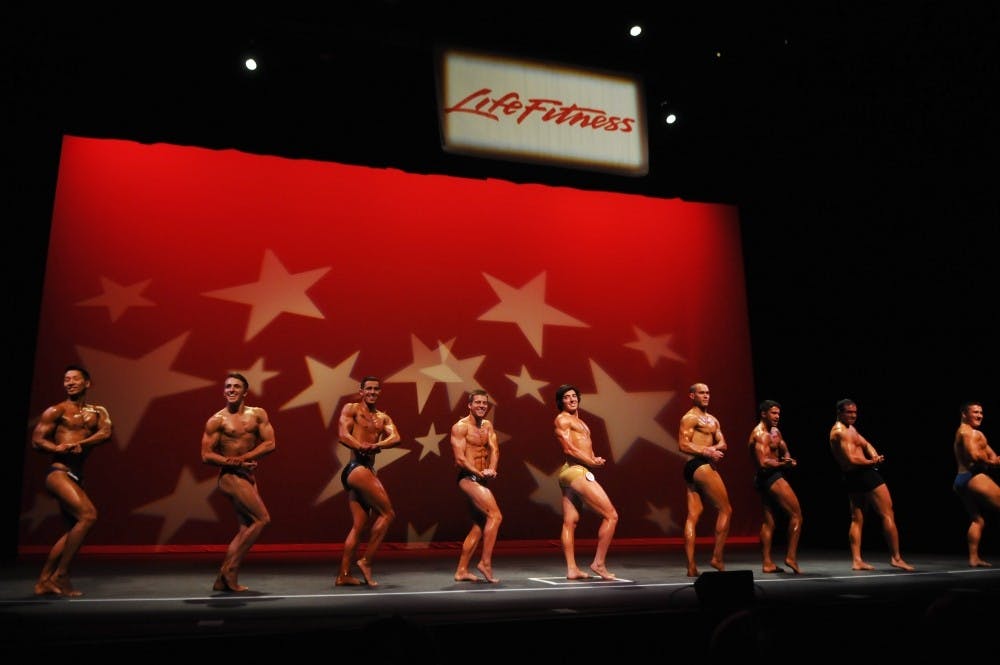Pull out the crop tops and short shorts. We’re three weeks away from summer vacation. In these last frantic weeks, Pottruck is packed with students looking to slim down, tone up and burn off finals anxiety in time for break. But there's more to fitness than what you can do on a treadmill. This week Street talked to bodybuilders and nutrition experts at Penn to learn how they approach eating for fitness.
Michael Greenstein (C’19) and Enoch Lee (N’19)
Michael Greenstein (C’19) and Enoch Lee (N’19) are avid weightlifters and members of Penn Barbell Club. But they take vastly different approaches to supplements and sports nutrition. A body–builder, Enoch regularly takes supplements to help him stay in shape and prepare for competition. Last fall Enoch competed in the Mr. and Ms. Penn bodybuilding competition. To prepare and cut down on body fat he used carb–cycling. Alternating 4 to 5 days of extremely low carbohydrate intake (less than 50 grams) followed by one day of high carbohydrate consumption (about 600 grams). “When I was carb–cycling, I had to get 250 grams protein per day. It’s just hard to eat that much meat.” This meant Enoch would consume several protein shakes a day in addition to eggs, meat, yogurt and fish. “It was hard. Carbs are in basically everything.”
Outside competition, Enoch regularly takes protein, branded chain amino acids (BCAA) and pre–workout. “I used Bodybuilding.com for nutrition guidelines—even before they started sponsoring me,” he laughed.
BCAAs claim to promote muscle protein synthesis and increase muscle growth over time. They are naturally found in eggs or meat. There’s no one formula for pre–workout, but most contain a mixture of vitamins, carbs and caffeine for a jolt and extra focus during a workout session. Enoch started lifting when he was 13; weight training came first and then nutrition. He uses supplements because he likes their benefits but doesn’t think they’re absolutely essential. “For most of my weight training I didn’t use supplements besides protein.”
Michael, a self–described powerlifter, takes an entirely different approach to training and nutrition. While bodybuilders focus on building muscle mass and losing fat for competition, powerlifters aim to increase overall strength. “I would rank consistency, training, food, and recovery ahead of supplements. Supplements should be your last priority.” He consumes carbs and proteins before and after lifting but prefers food to protein powder. “It’s very processed and just not as healthy as real food.” The best supplement is sleeping. Both Michael and Enoch emphasized that “consistency is key for both training and nutrition.”
Enoch’s Carb Cycle
Low Carb Day
- 4 eggs
- 8 egg whites
- 10 sausage links
- Salad with 7oz pork (x2)
- 2 protein shakes (2 cups skim milk + 2 scoops protein powder)
High Carb Day
- 3 medium baked potatoes
- 8 egg whites
- 5oz chicken breast over 2 cups rice (cooked) (x3)
- 4 slices of whole wheat bread with 2 tbs of peanut butter
- 1–2 protein shakes (2 cups skim milk + 2 scoops protein powder)
Allison Russell (Ph. D. Social Policy and Practice ’19)
Allison Russell, a bodybuilder and third–year Ph. D. student, takes the “if it fits your macros” approach to nutrition. Rather than banning certain foods, this diet calls for breaking down your daily caloric intake into the three macronutrient groups: proteins, fats, and carbohydrates. Currently she tracks her calories and macros with the MyFitnessPal app because it’s free and convenient. “Some people are very disciplined but I’ve found that without tracking you’re not going to see very many changes.”
To get in shape for competition, Allison upped her protein intake with protein shakes. “It’s very easy to control your consumption because protein powder is essentially just protein—no carbs or fat.” Allison doesn’t take other nutrition supplements, saying they don’t help her more than food or sleep. “Coffee is my pre–workout.”
Allison’s relationship with nutrition has completely changed since her undergrad days running track and cross country at Fordham University. “As a long distance runner, there was an emphasis on being ultra lean.”
She said her coaches didn’t really provide guidance on food. Weightlifting was discouraged out of fear it would make the runners too bulky. “As long as I was skinny, no one cared if I ate a bag of Goldfish for dinner.” Now she tries to eat whole unprocessed foods while meeting her macro splits.
Professor Monique Dowd, a licensed dietician and professor of nutrition in the School of Nursing, echos Allison’s stance on prioritizing whole foods over processed supplements. Working with patients to help them lose weight, she encourages them to eat a mix of protein, fiber, whole grains and healthy fats to keep hunger at bay. “Your body is going to break down Rice Krispies much faster than steel–cut oats, leaving you hungry and wanting to eat more.” For exercise, Professor Dowd recommends her patients schedule their workout in the evening to prevent overeating during the day. She says total calorie consumption matters more than macronutrients for weight loss. “Diets like Paleo or Keto that eliminate food groups only work because you are forced to consume fewer calories. You can remove fats or carbohydrates and you’ll see the same weight loss effects in the long run.”
Ultimately diet depends on your goals and lifestyle. For bodybuilders to pack on muscle and lean out for competition they need to drastically up their protein intake and maintain a strict caloric deficit. However, even bodybuilders cannot stay in competition shape year round. “Staying 10% body fat isn’t healthy or sustainable,” emphasized Allison. “Right now I’m trying to lean out a little for the summer, but without a competition coming up, my focus is on gentle gradual change rather than drastic cutting.” Currently she keeps her splits between 35% protein (130 grams), 35% carbohydrates and 30% fats.
Allison’s advice is to “figure out what works for you and be gentle. The body changes if you’re patient and consistent.”







